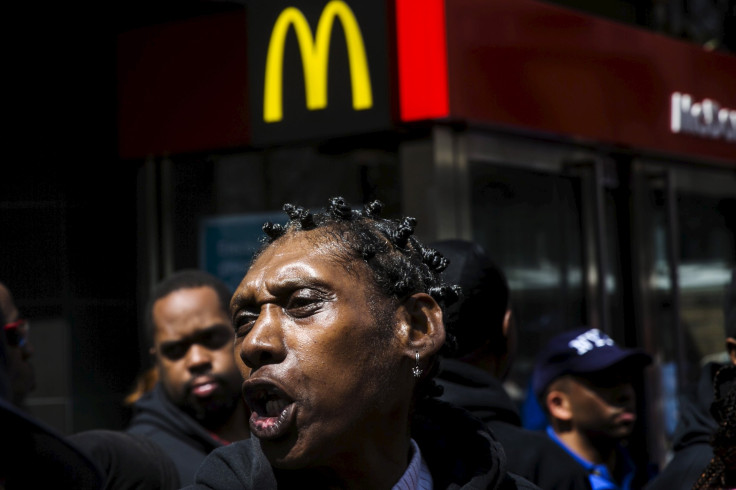Pension Fund Officials Cry Foul As Corporate America Splurges On Stock Buybacks

A group of public pension officials has raised the alarm over record stock buybacks at the nation's largest corporations. The coalition, which collectively oversees more than $860 billion in public worker retirement funds, warned that stock repurchases by major companies hamper productive investments and threaten long-term growth.
"If the pendulum swings too far in favor of returning capital to shareowners, the future viability of the companies in which we invest may be placed at risk," the group wrote in a letter Wednesday.
The coalition pointed to McDonald's as a case in point. Even as the hamburger chain has suffered flagging growth and mounting discontent over its rock-bottom wages, McDonald's has redoubled its commitments to shareholders. The company repurchased $625 million of its own stock in the first three months of this year -- about 77 percent of its net income over that period. The company plans to return at least $8 billion to shareholders in 2015.
Those plans also have minimum-wage activists up in arms. As McDonald's prepares for its annual shareholder meeting in Illinois Thursday, thousands of fast-food workers demanding $15-an-hour wages descended on the premises. They, too, are highlighting what they consider to be excessive stock buybacks.
McDonald's is hardly alone in repurchasing vast quantities of its own shares. Since the financial crisis, corporations in the S&P 500 have directed roughly $2.5 trillion to stock buybacks, a trend that has reached record levels this year. In a recent research note, Goldman Sachs estimated that buybacks and dividends will account for virtually all of the returns in the S&P 500 in 2015.
Companies repurchase shares for a number of reasons. Options granted to senior emloyees dilute the stock, which can be mitigated through buybacks. Corporate boards advertise share repurchase programs as a way to signal optimism in future stock performance. Hedge fund activists like Carl Icahn often make buybacks a top demand.
But critics contend that as companies have gobbled up their own shares, they have been starved of fresh research and workforce investments. Cash that could otherwise pay for a raise or fund innovation, they argue, has been funneled to shareholders.
Buyback critics come in various stripes. Lawrence Fink, CEO of the world's largest asset manager, BlackRock, issued a warning to business leaders last month over "actions that can deliver immediate returns to shareholders, such as buybacks or dividend increases, while underinvesting in innovation." Earlier this month, Sen. Tammy Baldwin, D-Wis., asked the Securities and Exchange Commission to examine corporate buybacks. One SEC commissioner has since publicly questioned the practice.
The new campaign by public pension officials illustrates the growing unease around buybacks among institutional investors. The coalition behind the letter includes fiduciaries -- officials with a legal obligation to look out for retirees' best interests -- of public pensions in Chicago, New York and California, some of the largest funds in the country.
With their sizable and wide-ranging investments in top companies, pension funds have played a growing role in shareholder campaigns, rallying around issues like executive pay and corporate governance.
But the campaign highlights an apparent contradiction in the world of shareholder activism. While major investors often cry loudly for buybacks -- which tend to inflate stock prices in the short term -- the coalition of pension fiduciaries is arguing the opposite. They worry that companies are not "adequately reinvesting for sustainable returns over the long term."
The pension fund fiduciaries, among them New York City Comptroller Scott Stringer, expressed support in the letter for a proxy proposal that would broaden shareholders' access to McDonald's annual meeting.
© Copyright IBTimes 2024. All rights reserved.





















